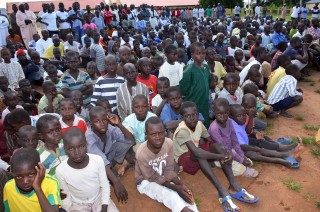Reports have emerged from the Nigerian Drug Law Enforcement Agency (NDLEA) that, following the arrest of a drug peddler, Internally Displaced Persons (IDP) camps have become a haven for the proliferation of hard drugs. Baba Haruna, a 48-year old drug peddler who was arrested in February 2016, was reportedly conducting his drug business within certain IDP camps in Borno state, disguised as an NDLEA official.
Premium Times reports that before the rise of insurgency in north-eastern Nigeria, Borno state has been known as a major hub for illicit drug trafficking, where merchants have links from all over West Africa, through the Central African Republic to Europe.
According to the NDLEA, Baba Haruna is guilty of selling illicit drugs, including cocaine, to addicts within the camp as well as those in the host community, Maiduguri. However, it is difficult not to question where the addicts are getting the money to fund their addiction to illicit drugs. It is rather worrisome that drug addiction and smuggling thrive in the same IDP camps where hunger and malnutrition seem to be the order of the day. Vanguard Nigeria reported, last month, that according to the Borno Emergency Management Agency, about 450 children died of malnutrition in 28 Internally Displaced Persons camps in the state in 2015.
But there are several truths about poverty and drug addiction that show the possibility of drug addicts, purchasing illicit drugs in the most dire of circumstances to feed their addiction. United States’ based Sea Cliff Recovery Center speaks on this possibility, stating that addicts that are low income earners often find themselves becoming addicted to illicit drugs regardless of their financial state. According to Sea Cliff, illicit drugs are easy to get on the streets and young people living in poverty are often surrounded by drug dealers and drug addicts. It so follows that in IDP camps, young people become targets of drug peddlers as well as becoming easy recruits of already established drug addicts.
While there are a mix of the elderly, youths and children in Borno IDP camps, the major users of illicit drugs are the late teenagers/young adults. According to 2013 statistics provided by NOI Polls, these people are mostly between 19 to 29 years of age.

Unlike regular homes where parents can exercise a level of control over the activities of their children, parents in IDP camps have little or no control. Premium Times in their report gave proof of this. A father of six children, Bashir Diwama, said he was afraid his kids will end up mixing up with substance abusers as residents in camp. “I have tried all my life to ensure my children are brought up in a decent environment so that they grow up to be good citizens. But here, in camp, where the children now mix up with all kinds of peers, I fear for their future, because one does not have control over one’s family here,” he said.
However, drug abuse could be a coping mechanism of sorts for those in IDP camps. According to this 2009 paper on substance abuse and homelessness, people who are homeless often turn to drugs and alcohol to cope with their situations. They use substances in an attempt to attain temporary relief from their problems.








